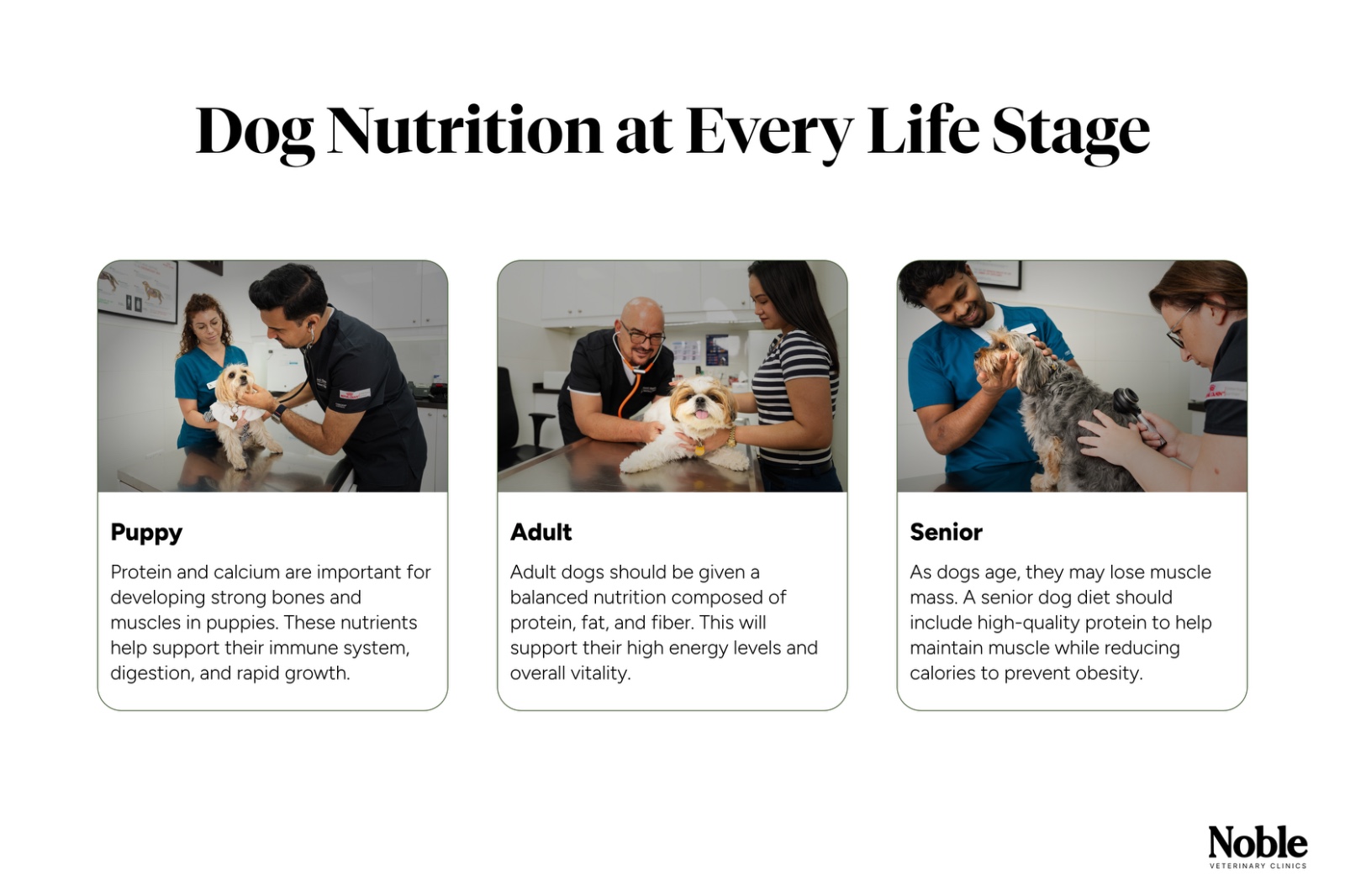Dog Nutrition Guide: Choosing The Right Food For Your Dog’s Age And Breed
A well-balanced diet is necessary to maintain your dog’s overall health. Without it, your dog becomes susceptible to diseases and illnesses, shortening its lifespan and contributing to a poor quality of life.
No diet plan fits all dogs. Depending on breed and age, you may need to tailor your dog’s diet. Fortunately, many dog food options are available in Dubai, making it easier for pet owners to provide the proper diet for their pets.
This dog nutrition guide will point you in the right direction so you can always feed your furry friend healthy and delicious food.
Dog Nutrition Based on Breed
Every dog breed has unique nutritional needs since the size, activity, level, and health conditions differ. To help you create the best diet plan for your dog, we can categorize them into six breed categories, each with specific dietary needs.
-
Small Dog Breeds
Small dogs, like French bulldogs and Dachshunds, typically weigh between 5 and 11 kilograms. Their fast metabolism requires energy-dense foods, so their diet must contain protein and healthy fats. But since they have small mouths and stomachs, you should prepare small food portions. You can include small kibbles in their diets for easy digestion.
-
Toy Dog Breeds
Toy breeds are tiny dogs like Pomeranians and Chihuahuas. They have tinier stomachs than small breeds, so you give them smaller kibbles packed with concentrated nutrients. These kibbles will help them get all the necessary nutrients, even in small meal portions.
-
Large Dog Breeds
Large dogs like Labrador Retrievers and German Shepherds are prone to joint issues. Their diets should include calcium and phosphorus. Calorie intake must be controlled to prevent obesity, which can increase pressure on their joints.
-
Giant Dog Breeds
Giant dogs have a slow metabolism but require a lot of nutrients to support their size. Like large breeds, giants like Saint Bernards can have joint problems, and overfeeding them with protein and a high-calorie diet can harm their health.
-
Working and Active Dog Breeds
Huskies and Border Collies are highly active dogs that need a diet consisting of protein and fats to support their muscle mass and energy. But, their daily activity must match the dog nutrients you feed them. If you don’t provide enough exercise while giving them a high-calorie diet, their overall health might decline.
-
Flat-Faced Dog Breeds
Dogs such as Pugs and Bulldogs have flat faces, making it difficult for them to breathe and eat simultaneously. Luckily, special kibbles can make this easier. They’re also less active than most breeds, so be careful with the amount of calories in your meals to prevent becoming overweight.
If you have a mixed-breed dog and are unsure which category it falls under, you can take it to vet clinics in Dubai, where expert veterinarians can examine your dog. They’ll determine your pet’s health situation and what breed is dominant in your dog, helping you create a beneficial diet plan.

Dog Nutrition Based on Age
Your pet’s breed isn’t the only factor to consider regarding dog nutrition. You must also consider its age. We can categorize a dog’s life into three stages: puppy, adult, and senior. Each stage will require dietary adjustments.
-
Puppies
Puppies are fragile little creatures, and their diet needs to be packed with beneficial dog nutrients to grow big and strong. The first few weeks of a puppy’s life are about building the immune system.
As you take them for puppy visits for their essential vaccinations, you need to support their growth with a diet of protein, healthy fats, and calcium to boost their immune systems. You should also include DHA in their diets as well for brain development.
-
Adult Dogs
When your pup becomes an adult, it will be more active and require a more balanced diet to maintain its overall health. Provide them with meals that include the right mix of healthy fats, protein, and fiber.
-
Senior Dogs
As dogs age and become seniors, they’ll be less active and susceptible to diseases as their health declines. They’re more at risk of obesity and muscle loss, so make sure their diet is low in calories but high in protein.
Wet vs. Dry Dog Food: Which Is Better?
Most pet supply shops offer two dog food variants, wet and dry. Both have their benefits and are packed with the needed dog nutrients. Choosing between wet and dry dog foods will depend on your dog’s age, current dental condition, and preference.
-
Wet Dog Food
Wet dog food is cooked and processed food that usually comes in sealed pouches or cans. It contains high moisture, which is perfect for dogs that don’t drink enough water. Senior dogs and those with dental problems prefer wet dog food as it’s easier to chew.
-
Dry Dog Food or Kibbles
Dry dog food, or kibbles, is the most common and readily available type. Many pet owners prefer kibbles over wet dog food because of their convenience and long shelf life. Dry dog food is also better for dogs with excellent dental health, as it can help reduce plaque and tartar buildup. Active dogs can benefit the most from kibbles as they need high calories for daily activities.
Some pet owners prefer to feed their pets a diet with raw and natural nutrition for dogs. These diets often contain uncooked and unprocessed meat, bones, organs, fruits, and vegetables, aiming to mimic the natural diet of dogs in the wild.
But it’s best to consult your vet before giving your dog raw dog food, as this kind of diet might make your dog more susceptible to parasites if you don’t regularly do deworming treatments.
Tailoring Dog Nutrition for Optimal Health As Your Dog Ages
Your dog will rely on you to keep it healthy and safe, so you must provide them with meals that are packed with the essential dog nutrition it needs. Remember to tailor your dog’s diet depending on its breed and age to meet its nutritional requirements.
A thoughtfully customized diet will promote a longer, healthier life for your dog, ensuring it thrives physically, mentally, and emotionally.
Frequently Asked Questions
What are the basic nutritional requirements for dogs?
Dogs need a balanced diet that includes protein for muscle growth and maintenance, fats for energy and healthy coats, carbohydrates for digestive health, vitamins, and minerals. They also need adequate fresh water to keep them hydrated every day.
What dog food in Dubai provides the best nutrition for dogs?
In Dubai, look for high-quality dog foods that meet AAFCO standards. Dogs have unique dietary requirements, so you should consult your vet to understand your pet’s needs.
How much dog food should I feed my dog?
Generally, you should feed your dog about 2-3% of its body weight daily, divided into two or three meals. However, you must consider the dog’s daily activities and breed when measuring its food. When in doubt, always consult an expert veterinarian for advice.
How do I transition my dog to a new diet?
Gradually mix the new food with your dog’s old food for about a week, beginning with a ratio of 75% of the old dog food and 25% of the new food. While doing this, monitor your pet’s digestion to ensure the transition isn’t causing any problems.
Can I feed my dog human food?
You can safely feed your dog with human food, such as fruits and vegetables. You can also give unseasoned, cooked meats. However, avoid giving your dog toxic foods like chocolates, onions, and grapes.




